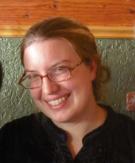Katherine Bowers

Education: BA, MA, University of Virginia; MA, PhD, Northwestern University
Katherine Bowers is a postdoctoral Research Associate in the Department of Slavonic Studies at the University of Cambridge. She is also a Research Fellow of Darwin College, Cambridge.
When did you first develop an interest in Slavic, East European and Eurasian Studies?
Growing up in Cold War West Germany, I was always intrigued by the idea of the East. In high school, I read a lot of Russian and Czech literature in translation, and when I went to university, I leapt at the opportunity to study Slavic languages. My first year I took Russian language and a Russian imperial history course and began to see how historical and cultural context shaped Russian literature - the beginning of a slippery slope that continues to the present.
How have your interests changed since then?
Traveling to Russia and Eastern Europe, and seeing the literary environment in person, proved decisive in shaping my research interests. A semester spent studying in St. Petersburg revealed the world of the Petersburg Text to me in ways I hadn’t anticipated and sparked an interest in the depiction of space in literature. Similarly, a summer studying at Tomsk State University and traveling in Siberia piqued my interest in notions of empire and expanse in Russian literature, and I began to think seriously about the value of travelogues and expedition logs as research materials. My interest in Russian literature has always been tied to cultural and historical context, but discovering this context in my own travels has set me down research paths that I would not have followed if my experience had been confined solely to books.
What is your current research project?
I’m currently working on two research projects. The first is a monograph that extends my doctoral research about the influence of gothic fiction on Russian realism. My work examines the lines between genre and innovation in the nineteenth century, focusing on spatial and psychological depiction in authors such as Dostoevsky, Turgenev, Saltykov-Shchedrin, Leskov, and Chekhov. The second is the project I am attached to at Cambridge, which is called “Information Technologies in Russia, 1450-1850.” For this project, I research specific cultural episodes of technological import such as literary circles of the 1810s and 20s as information networks, or eighteenth-century imperial decrees that directly affect public space.
What do you value about your ASEEES membership?
ASEEES provides wonderful opportunities for interdisciplinary engagement with other scholars in the field. The annual National Convention naturally lends itself to productive discussions that cross disciplinary boundaries. Slavic Review, in its academic rigor and interdisciplinary agenda, similarly showcases work that merges disciplines. These kinds of discussions are invaluable for Russian literary scholarship, which is taking an increasingly interdisciplinary focus.
Besides your professional work, what other interests and/or hobbies do you enjoy?
I play the cello, if not with talent, then with enthusiasm. I also am fond of opera and ballet, and have really enjoyed living so close to London these past few years. I love to travel, to explore new places and try new foods!
